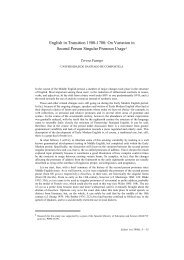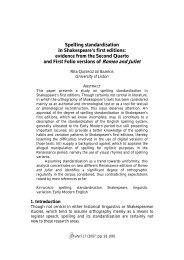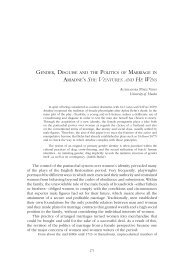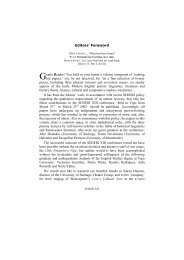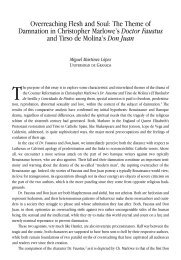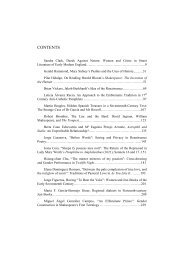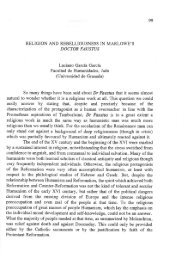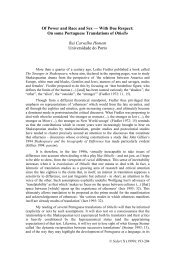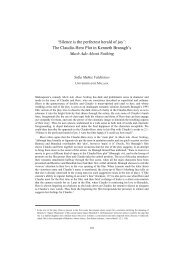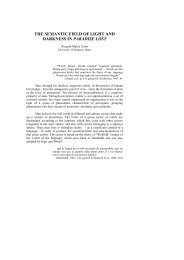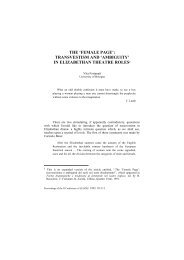Lexical Ambiguity and Wordplay in Shakespeare - SEDERI
Lexical Ambiguity and Wordplay in Shakespeare - SEDERI
Lexical Ambiguity and Wordplay in Shakespeare - SEDERI
Create successful ePaper yourself
Turn your PDF publications into a flip-book with our unique Google optimized e-Paper software.
ISABEL DE LA CRUZ 34<br />
A compact <strong>in</strong>stance of antanaclasis comes from Henry V (V.i.92) ‘To Engl<strong>and</strong><br />
will I steal, <strong>and</strong> there I’ll steal’, where the word steal has the double mean<strong>in</strong>g of 1)<br />
‘to go, move, depart secretly’ <strong>and</strong> 2) ‘to take someth<strong>in</strong>g away from someone’. A<br />
similar example is that <strong>in</strong> Twelfth Night (II.iv.73): ‘Give me now leave to leave<br />
thee’ where leave has the mean<strong>in</strong>g of ‘permission’ as a noun, <strong>and</strong> ‘depart’ as a verb;<br />
another case can be found <strong>in</strong> Hamlet with the word matter, which can <strong>in</strong>terpreted as<br />
‘subject, topic’ or ‘problem, concern’, when Polonius asks Hamlet:<br />
POLONIUS: What do you read, my lord?<br />
HAMLET: Words, words, words<br />
POLONIUS: What is the matter, my lord?<br />
HAMLET: Between who?<br />
POLONIUS: I mean, the matter that you read,<br />
my lord. (II.ii.195-200)<br />
Very closely l<strong>in</strong>ked to this, is DILOGY, which is the use of an ambiguous or<br />
equivocal word or expression. This is ma<strong>in</strong>ly achieved by means of homonymy.<br />
Some clear <strong>in</strong>stances of homonymy are found <strong>in</strong> the sonnet 135, where all the<br />
possible mean<strong>in</strong>gs of will are present <strong>in</strong> the passage: Will as a noun mean<strong>in</strong>g ‘desire,<br />
wish, capacity to do someth<strong>in</strong>g, determ<strong>in</strong>ation’; as a verb with the same mean<strong>in</strong>g<br />
<strong>and</strong> as an auxiliary to <strong>in</strong>dicate future tense; as a short or pet name for William,<br />
Whoever hath her wish, thou hast thy Will,<br />
And Will to boot, <strong>and</strong> Will <strong>in</strong> over-plus;<br />
More than enough am I that vex thee still,<br />
To thy sweet will mak<strong>in</strong>g addition thus.<br />
Wilt thou, whose will is large <strong>and</strong> spacious,<br />
Not one vouchsafe to hide my will <strong>in</strong> th<strong>in</strong>e?<br />
Shall will <strong>in</strong> others seem right gracious,<br />
And <strong>in</strong> my will no fair acceptance sh<strong>in</strong>e?<br />
The sea, all water, yet receives ra<strong>in</strong> still,<br />
And <strong>in</strong> abundance addeth to his store;<br />
So thou, be<strong>in</strong>g rich <strong>in</strong> Will, add to thy Will<br />
One will of m<strong>in</strong>e, to make thy large Will more.<br />
Let no unk<strong>in</strong>d ‘No’ fair beseechers kill;<br />
Th<strong>in</strong>k all but one, <strong>and</strong> me <strong>in</strong> that one Will<br />
A similar pun is created by play<strong>in</strong>g upon the words lie <strong>in</strong> Richard II:<br />
That lie shall lie so heavy on my sword<br />
That it shall render vengeance <strong>and</strong> revenge,<br />
Till thou, the lie - giver <strong>and</strong> that lie do lie<br />
In earth as quiet as thy father´s skull. (IV.i.66-69)<br />
But perhaps the richest example of this form of wordplay is to be found <strong>in</strong><br />
Cleopatra’s speech as she takes the asp from the basket:<br />
Come thou mortal wretch.<br />
With thy sharpe teeth this knot <strong>in</strong>tr<strong>in</strong>sicate<br />
Of life at once untie (V.ii.305-307)<br />
© Sederi X (1999): 31-36



